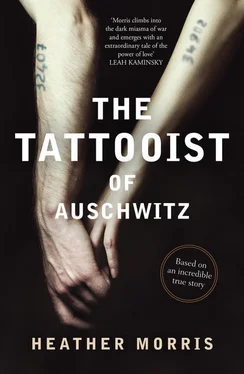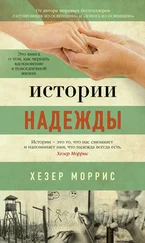‘We can get the job done faster if you let him pick himself up and get on with it,’ Lale says, watching Leon’s breath become short and sharp beneath Baretski’s boot.
Houstek bears down on the three men and mumbles something to Baretski. When Houstek disappears, Baretski, with a sour smile, pushes his foot down hard on Leon’s body before releasing it.
‘I am just a humble servant of the SS. You, Tätowierer, have been placed under the auspices of the Political Wing, who answer to Berlin only. It was your lucky day when the Frenchman introduced you to Houstek and told him how clever you are, speaking all those languages.’
There is no correct answer to this question so Lale busies himself with his work. A muddied Leon rises, coughing.
‘So, Tätowierer,’ Baretski says, his sick smile returning, ‘how about we be friends?’
•
An advantage of being Tätowierer is that Lale knows the date. It is written on the paperwork he is given each morning and which he returns each evening. It is not just the paperwork which tells him that. Sunday is the only day of the week the other prisoners are not forced to work and can spend the day milling around in the compound or staying near their blocks, huddled together in small groups – friendships brought into the camp, friendships made in the camp.
It is a Sunday when he sees her. He recognises her at once. They walk towards each other, Lale on his own, she with a group of girls, all with shaven heads, all wearing the same plain clothing. There is nothing to distinguish her except for those eyes. Black – no, brown. The darkest brown he’s ever seen. For the second time they peer into each other’s souls. Lale’s heart skips a beat. The gaze lingers.
‘Tätowierer!’ Baretski places a hand on Lale’s shoulder, breaking the spell.
The prisoners move away, not wanting to be near an SS officer or the prisoner to whom he is talking. The group of girls scatters, leaving her looking at Lale, looking at her. Baretski’s eyes move from one to the other as they stand in a perfect triangle, each waiting for the other to shift. Baretski has a knowing smile. Bravely, one of her friends advances and pulls her back into the group.
‘Very nice,’ Baretski says as he and Lale walk away. Lale ignores him and fights to control the hatred he feels.
‘Would you like to meet her?’ Again Lale refuses to respond.
‘Write to her, tell her you like her.’
How stupid does he think I am?
‘I’ll get you paper and a pencil and bring her your letter. What do you say? Do you know her name?’
34902.
Lale walks on. He knows the penalty for any prisoner caught with pen or paper is death.
‘Where are we going?’ Lale changes the subject.
‘To Auschwitz. Herr Doktor needs more patients.’
A chill runs through Lale. He remembers the man in the white coat, his hairy hands on that beautiful girl’s face. Lale has never felt so uneasy about a doctor as he did on that day.
‘But it’s Sunday.’
Baretski laughs. ‘Oh, you think just because the others don’t work on Sunday, you should get it off too? Would you like to discuss this with Herr Doktor?’ Baretski’s laughter grows shrill, sending more shivers down Lale’s spine. ‘Please do that for me, Tätowierer. Tell Herr Doktor it is your day off. I would so enjoy it.’
Lale knows when to shut up. He strides off, putting some distance between himself and Baretski.
As they walk to Auschwitz, Baretski seems in a jovial mood and peppers Lale with questions. ‘How old are you?’ ‘What did you do before, you know, before you were brought here?’
For the most part Lale answers with a question, and discovers Baretski likes talking about himself. He learns he is only a year younger than Lale, but that is where the similarities end. He talks about women like a teenager. Lale decides he can make this difference work for him and begins telling Baretski of his winning ways with girls, how it’s all about respecting them and what they care about.
‘Have you ever given a girl flowers?’ asks Lale.
‘No, why would I do that?’
‘Because they like a man who gives them flowers. Better still if you pick them yourself.’
‘Well, I’m not gonna do that. I’d get laughed at.’
‘By who?’
‘My friends.’
‘You mean other men?’
‘Well, yeah – they’d think I was a sissy.’
‘And what do you think the girl getting the flowers would think?’
‘What does it matter what she thinks?’ He begins smirking and yanking at his groin. ‘That’s all I want from them, and that’s what they want from me. I know these things.’
Lale walks ahead. Baretski catches up.
‘What? Did I say something wrong?’
‘Do you really want me to answer that?’
‘Yeah.’
Lale rounds on him. ‘Do you have a sister?’
‘Yeah,’ says Baretski, ‘two.’
‘Is how you treat a girl the way you want other men to treat your sisters?’
‘Anyone does that to my kid sister and I’ll kill them.’ Baretski pulls his pistol from its holster and fires several shots into the air. ‘I’ll kill them.’
Lale jumps back. The gunshots reverberate around them. Baretski is panting, his face red and his eyes dark.
Lale raises his hands. ‘Got it. Just something to think about.’
‘I don’t want to talk about this anymore.’
•
Lale finds out that Baretski isn’t German but was born in Romania, in a small town near the border of Slovakia, only a few hundred kilometres from Lale’s hometown of Krompachy. He ran away from home to Berlin, joined the Hitler Youth and then the SS. He hates his father, who used to beat him and his brothers and sisters viciously. He is still worried about his sisters, one younger, one older, who live at home.
Later that night as they walk back to Birkenau, Lale says quietly, ‘I’ll take your offer of pen and pencil if you don’t mind. Her number is 34902.’
After dinner, Lale slips quietly over to Block 7. The kapo glares at him but says nothing.
Lale shares his extra evening rations, only a few crusts of bread, with his friends from the block. The men talk and exchange news. As usual, the religious among them invite Lale to partake in evening prayer. He politely declines and his refusal is politely accepted. This is the standard routine.
•
Alone in his single room, Lale wakes to the sight of Baretski standing over him. He didn’t knock before entering – he never has – but there is something different about this visit.
‘She’s in Block 29.’ He hands Lale a pencil and some paper. ‘Here, write to her and I will make sure she gets it.’
‘Do you know her name?’
Baretski’s look gives Lale his answer. What do you think?
‘I’ll come back in an hour and take it to her.’
‘Make it two.’
Lale agonises over the first words he will write to prisoner 34902. How to even begin? How to address her? Eventually he decides to keep it simple, ‘Hello, my name is Lale.’ When Baretski returns, he hands him the page with only a few sentences on it. He has told her he is from Krompachy in Slovakia, his age, and the make-up of his family, who he trusts are safe. He asks her to be near the administration building next Sunday morning. He explains that he will try to be there too, and that if he isn’t it will be because of his work, which isn’t regulated like everyone else’s.
Baretski takes the letter and reads it in front of Lale.
‘Is this all you have to say?’
‘Anything more I’ll say in person.’
Baretski sits down on Lale’s bed and leans in to boast about what he would say, what he would like to do, if he was in Lale’s situation, that is, not knowing if he will still be alive at the end of the week. Lale thanks him for the input but says he prefers to take his chances.
Читать дальше






![Хезер Моррис - Дорога из Освенцима [litres]](/books/397846/hezer-morris-doroga-iz-osvencima-litres-thumb.webp)
![Хезер Димитриос - Токсичный роман [litres]](/books/408645/hezer-dimitrios-toksichnyj-roman-litres-thumb.webp)




